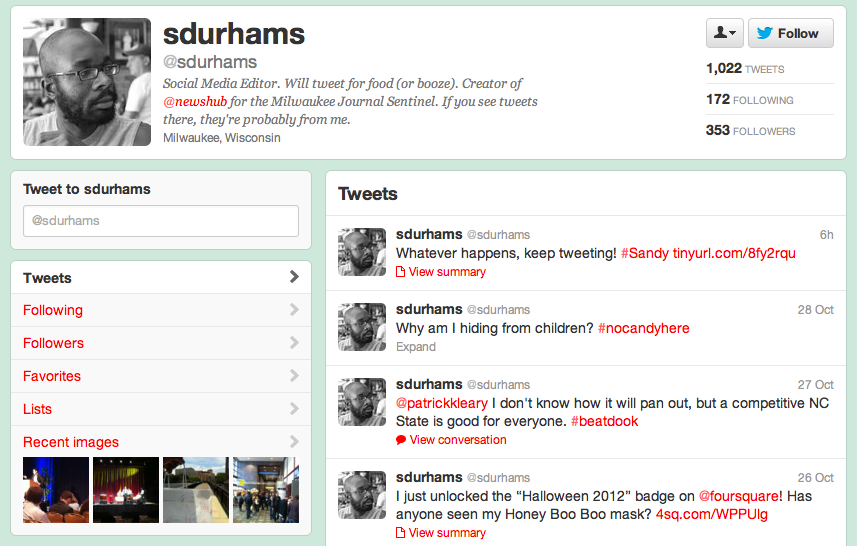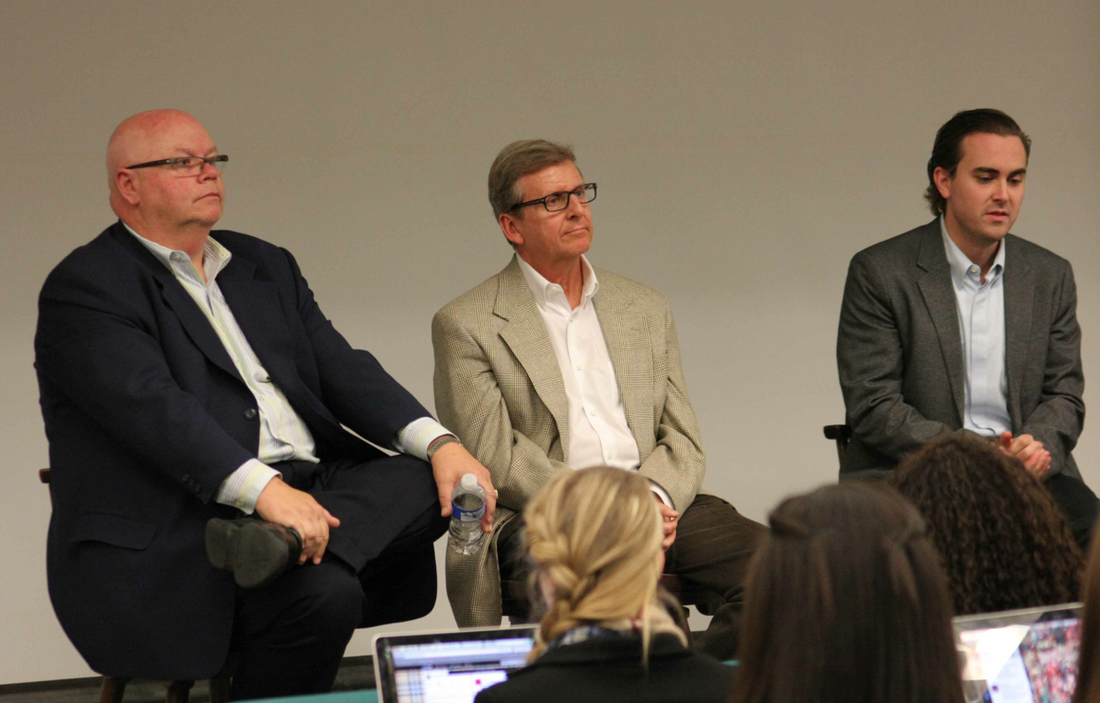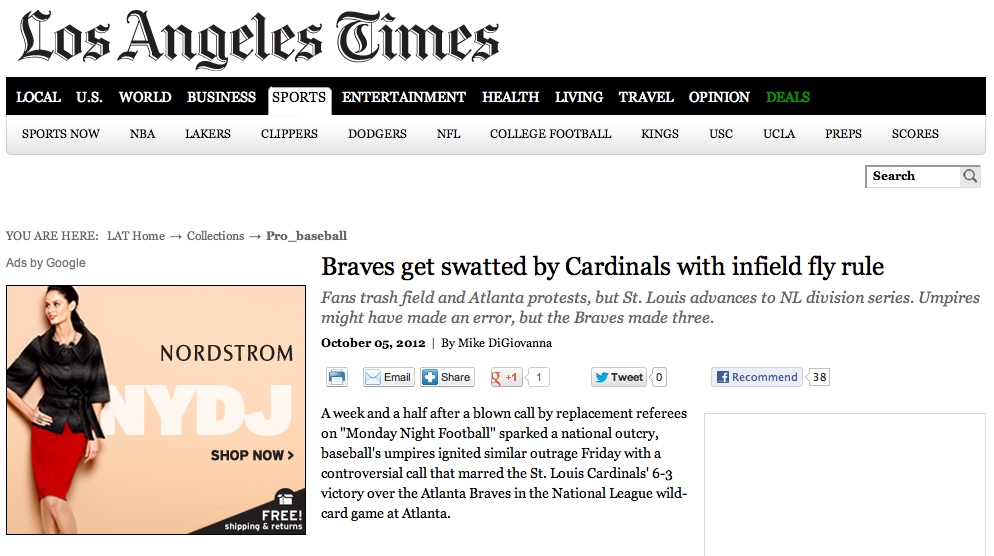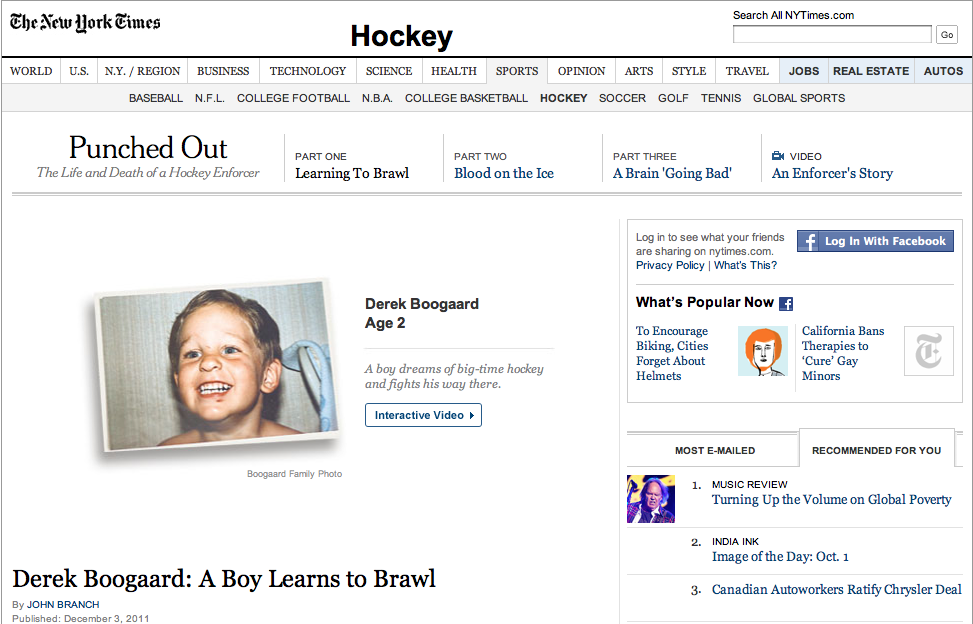Sharif Durhams came to visit #loweclass #sports last Thursday to discuss the Milwaukee Journal Sentinel's coverage of sports, and how the newspaper has used online and social media outlets to get their stories out to the public. Durhams is the social media editor for the Journal Sentinel, and is also one of the breaking news reporters for the paper.
Durhams started to his presentation talking about how sports is a business, and many people forget that. The Journal Sentinel found out after doing a little research that the difference in revenue from the Packers winning the Super Bowl to them losing the Super Bowl is about $1 million. The Journal Sentinel on the online front, has to deal with websites such as Bleacher Report (which I proudly write for #shamelessplug), which was recently bought out by Turner Sports for $200 million. Sports networks are realizing how important it is to have an online presence, and the newspapers have to combat that.
The Journal Sentinel has decided to combine the old school of journalism, meaning the print version that is reads as a story, and the new school of journalism, meaning the story is meant to be a conversation between the writer and the audience. Ways the Journal Sentinel has done so is by creating a live blog for Packer games, where Tom Silverstein will give live analysis of the game, and then return to answer any questions the fans have after the game. Other inter actives include "Pick the Winners", where fans can poll whether the Packers will win or lose which game on the schedule, and a map where fans can see the location of "Packer Bars" around the country. Durhams has had a helping part in creating each of these interactives.
Durhams, being a member of the breaking news desk of the Journal Sentinel, follows how breaking news affects the traffic to the jsonline.com, the newspaper's website. During class, there was news that Greg Jennings was going to have groin surgery. This became the second most visited page on the Journal Sentinel's website during class, where there were about 10,00 visits to the site. During the Brookfield Mall shooting, that number was doubled. When people find out about breaking news, he says they then turn to the Journal Sentinel to confirm the rumors they are hearing. The website has to have information ready to go so that the people keep coming back to get their information on breaking news stories.
Durhams visit to #loweclass was another very entertaining speaker. He clearly knows his stuff about social media, online media, and how it relates to getting a story out to the people. He acknowledges the fact that a journalist's job never really ends; it's a 24/7 commitment. I'm looking forward to listening to the experiences that other #loweclass
Marquette welcomed sports executives from Milwaukee Wednesday night for a “Career in Professional Sports” seminar held in Cudahy Hall. Milwaukee Bucks General Manager John Hammond, Milwaukee Brewers Assistant General Manager Gord Ash, and John H. Steinmiller, manager of media relations for the Milwaukee Brewers, spoke at the event, which was moderated by OnMilwaukee.com co-founder Jeff Sherman and sponsored by alumni networking group Marquette Circles. Steinmiller, who graduated from Marquette in 2004, started out working for the Milwaukee Journal-Sentinel his senior year in high school, and worked his way through Marquette student media during college. After graduation, he entered the sports business by getting a job with the Milwaukee Brewers, a process which he talked about during the seminar. “You have to be ready to (hear) ‘no,’ because there are only so many jobs,” Steinmiller said. “I’ve applied for jobs out of college with numerous NBA teams, numerous football teams, baseball teams, and where do I end up? Right here, five miles away from where I started.” Ash reiterated what Steinmiller said, also discussing how he worked his way up from ticket salesman for the Toronto Blue Jays to general manager of the team. “In the sports business, it’s getting your foot in the door, at whatever level that can be,” Ash said. “In most cases, it will probably be below your capability, and you have to accept that that’s your opportunity. Once you’re in, your capabilities can demonstrate you’re capable of doing more.” Hammond took a different approach to his rise to becoming the general manager of the Bucks, but still has the same central ideas that the other two held. “With the exception of my very first job that I ever had…I’ve never had a job that I’ve pursued,” Hammond said. “Any job I’ve every applied (for), I haven’t gotten. Every opportunity I’ve had has been presented to me. Sometimes people try too hard, and you have to just let it happen.” Dan DeWeerdt, senior director of engagement communication and events for Marquette Circles who organized the seminar, said the event was an opportunity through the Marquette Circles’ eMentor program to connect with Marquette alumni and friends who are willing to share their experiences. The eMentor program is designed to provide students and alumni with advice on careers, industries and organizations pertaining to different fields. “Marquette alumni are really not only passionate about the university, but they’re passionate about the students,” Deweerdt said. DeWeerdt said that this event was held so that students maybe not yet affiliated with eMentor could start networking with people already in the sports business. “It’s important to remember that it’s never to early to network,” DeWeerdt said. “You never know who’s going to be connected to someone.” DeWeerdt also said that networking can open up unique opportunities for students, and they should not take those for granted. “One thing for consideration is to never limit yourself,” DeWeerdt said. “Just keep in mind that Marquette alumni truly do want to help students.” Steinmiller agreed with DeWeerdt and spun it specifically to the realm of sports. “I think it’s important to find something that you’re good at and see how you can apply that to sports,” Steinmiller said. “Whatever you’re good at, there’s a job in sports for that.”
Last Thursday, #loweclass #sports welcomed its first speaker: Don Walker. Walker writes the Business of Sports blog for the Milwaukee Journal-Sentinel, while also covering the city hall beat for the newspaper. Walker stressed the use of social media for journalists. he stressed the ability for Twitter to be not only a source for news but also a way to release a story to the public. Twitter has become more geared toward the reporters, while Facebook has become larger for the teams themselves. Walker also talked about how with the onset of the internet, teams can now break their own stories. An example he used was the Washington Redskins. The team owns their own radio station, which will break the starting lineups and injuries for the team. Walker talked how that makes being a reporter more difficult, because the mainstream media used to break those stories. Walker gave #loweclass a first-had account of what reporters are doing now to get stories, and how online media has given journalism a slight twist in practice and writing. After the class, my attention turned completely to the Wild Card game on Friday night. My St. Louis Cardinals were taking on the Atlanta Braves in Atlanta for the inaugural Wild Card game. The Braves were seen as the heavy favorites in the game, and the Cardinals were looking to start a campaign to defend their 2011 World Series title. The Cardinals won the game 6-3, but that is not the story. The story is the controversial infield fly out that was called in the bottom of the eighth inning. What could have been bases loaded with one out became runners on second and third with two outs. Fans of the Braves say that call cost them the game. However, let's say that the play stands, the Braves' next batter hits into an FC. A runner scores, runners on second and third, and two outs. Same spot where the game is at, but the Braves receive an extra-run for the bad call. The Braves still get the third out because the next batter strikes out swinging. No more runs are scored, and the Braves lose 6-4 instead of 6-3. The Braves cannot blame the umpire's bad call for their loss. The team that committed the least amount of errors committed three that game. Two of those errors led to four unearned runs. Without those errors, the Braves win 3-2. So what really caused the Braves to lose the game? It was their terrible defensive game. The umpires became the scapegoat. Just like in the Packers-Seahawks game. The beginning of my weekend was great. I got to have a personalized lecture from Don Walker about sports journalism and online media, and the Cardinals made it to the NLDS. Can the magic happen again? I think so. #12in12.
Sports have a way of capturing those who love sports and throwing them into a heated debate with whomever about whatever. Whether you are a die-hard hockey fan who can't stand having another NHL season possibly cancelled (myself), or a city hall beat writer for the Milwaukee Journal-Sentinel (Don Walker), every fan likes to give their opinion.
Walker's blog, The Business of Sports, is not like a blog that most sports fans would expect to see. Instead of having content, such as the scores from the Brewers final game of the regular season, or a preview of the NL wild card game between the St. Louis Cardinals and Atlanta Braves (couldn't pass it up), Walker instead focuses on exactly what the title of his blog says, the business of sports.
I would think that in this day of age, sports business is an aspect of sports that is very overlooked, but very essential in understanding the entirety of sports. While we the fans look at these stars as making millions upon millions of dollars for playing a game, we don;t think twice about where the money is coming form and how that money is spread out throughout the organization and the league in general.
In his blog, Walker talks about various aspects of sports business. From Aaron Rodgers doing another State Farm commercial to Miller Park not hitting 3 million fans this season, Walker pretty much hits it all. But, I still feel like there was one major issue that could end up being a decently sized project for Walker, but could yield some great stories.
As a fan, I don't look far into how the money a team makes is overall shared between the league and the other owners. If Walker could do a series of looking into not only what each respective league makes, but what the revenue sharing system is between the owners of the league, it could give some great insight as to why nearly all of the major league sports have had lockouts to try to even out the different between the players and the owners. Having a series that would explain that to sports fans could be extremely helpful for fans who cannot understand the business aspects of sports.
Walker does a great job with his blog. While his posts may not be novels, they still report the information that he found and tells a story with that information. He covers a side of sports that not many people look for, but is still integral in understanding the sporting world in general. I highly recommend reading Walker's blog if you
The Online News Assiciation is a nonprofit membership organization for digital journalists, connecting journalism, technology, and innovation. Each year, they have finalists and winners of ONA awards. These awards are given out to winners in numerous categories ranging for best feature story for a large media outlet to the best news and and online commentary by a student run publication. For #loweclass #sports, we looked at four of these finalists. The first article I chose to look at was 2008 Breaking News winner for a medium outlet, the Kirkwood Shootings by the St. Louis Post-Dispatch. Being from St. Louis, I remember the news coverage from when it happened. The Post-Dispatch has a rundown of the stories, covering the story from multiple angles. The lead story is about the actual event, while the one below it is about the first time Kirkwood was thrown into the national spotlight because of the discovery of two kidnapped boys. Other articles include remembering those that died, and recounting the life of the man who attacked the city hall. One finalist for the 2008 award for the large Online Video Journalism was an ESPN's Outside the Lines report on the Youtube Baby. Youtube Baby focus around an 8-year-old boy from Chicago, who is the self-proclaimed "No. 1 kindergarden Prospect" in America. Marquis Walker has met NBA stars such as Steve Jackson, Shawn Marion, Kevin Durant, and even Lebron James. These stars give the number one ranking credibility. Not all of the stories are happy stories though. One of 2011's finalist for Breaking News by a small news source was the Vancouver Sun's coverage of the 2011 Stanley Cup Final riots. The Vancouver Canucks lost Game 7 of the Stanley Cup Finals to the Boston bruins, which was also the only game the Canucks lost at home. Their coverage of the story is heavily geared towards photos capturing the event, while also having a story that reads like a live update. The Sun also took raw footage from youtube and paired it with photos that they captured of the same event to give the read two different views of the story. However, my personal favorite is Punched Out: The Life and Death of a Hockey Enforcer by the New York Times. The story is centered around Derek Boogaard, an enforcer for the Minnesota Wild and New York Rangers. Boogaard slowly fell into an addiction to pain killers to help cope with the constant headaches from multiple concussions, as well as pain in his hands and joints from repetitive punches thrown. Boogaard died in his sleep on May 13, 2011. The New York Times has three separate parts of the story written, each seven pages long. To accompany this three part feature, they also paired three separate videos that cover the same content. Because of the multimedia project, the New York Times was a finalist for the 2012 Best Feature of a Large media outlet.
Perhaps just because the story is about hockey, but I love what the New York Times did with the Derek Boogaard story. It talks about a guy who willingly accepts his role on the team and does it the best he can because it was what he loved. The pairing of long form journalism with videos that attract the visual audience is a great way to tell the story. Overall, he ONA does a great job of recognizing the best journalism from around the world, and is a great resource to look for good j
|






 RSS Feed
RSS Feed